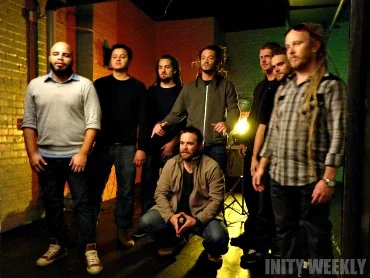SOJA Explodes onto the Colorado Music Scene: Featuring an Exclusive Interview with Jacob Hemphill
Before Denver’s Ogden Theatre filled up with an audience anxious to hear reggae beats and conscious lyrics, Jacob Hemphill – one of the founding members and lead singer of SOJA – was gracious enough to sit down with Inity Weekly’s Carla Felten and Gabriela Barbosa for an exclusive interview to discuss SOJA’s new album and the messages they hope to promote.
Inity: Congratulations on “Strength to Survive” being on the Top 40 Billboard list in Rolling Stone!
JH: Yeah, Billboard Top 40 – and it’s reggae! It’s not even party reggae. There isn’t one party song. We were surprised. I mean, I actually knew it was going to happen. We were so happy with the album that I kind of knew this is the time that I get to see it [on the Top 40 Billboard]. I have a copy of it on my bunk in the bus under my mattress so when I get home I can frame it. Pretty cool, dude – I’m stoked. Next is the cover!
Inity: What are the messages that you want to promote on “Strength to Survive”?
JH: Well it’s about a lot of stuff but if I could sum it up: We are not focusing on the things that matter as far as self-preservation of the human race goes. We’re focusing on all the wrong things, in my opinion.
Inity: If you had to pick a theme song off of this album that emulates these messages, what would it be?
JH: They’re all kind of about it. I mean, the first song is called “Mentality” because that’s the first thing we have to change is our mentality.
Inity: You have previously toured with The Green and Chris Boomer. What do you look for in upcoming artists that you collaborate with and take under your wing?
JH: We like guys whose music is really honest and who really love what they do…or girls. Anuhea is coming tonight so I have to say girls, too. She’s opening tonight and she’s amazing. I’ve been working with her, too. I’m so into the Polynesian scene. We’re always there and hanging out with them. And the musicians are so talented from those tiny little islands. Island people can play and sing. They have a vibe inside of them.
Inity: So you just came off of an international tour last year, and you did the Rombello Music Cruise. It seems like you have fans from all over the world, especially in Latin America and the Polynesian Islands. What do you see as the difference between the fans there and the fans here?
JH: Everybody listens to music for their own reasons. Some people listen to it because I’m harsh on politics and politicians. Some people listen to it because I’m harsh on environmental issues. Some people listen to it because it sounds good. Some people listen to it because they like love songs. Some people listen to it because they like Bobby Lee. But in South America I think people listen to it because the things I’m singing about are their day-to-day lives. Here in America, we’re a lot more sheltered and we don’t really see what happens in the world. Not that America is a bad place, I mean I love it, I live here. But we don’t really know what’s going on in the world and most of us don’t really care. That’s the thing, it’s not that we don’t care, it’s that we’re not presented with the right opportunities.
Inity: Where are some of your favorite places to play or where you feel the most welcome?
JH: There’s something good about every single place. Probably our most favorite place to play was Palau. Not ‘cause of playing, but when we were there, there hadn’t been a concert for 10 years. Palau is a magical place. We went to play for these kids and they made us a van – an old Toyota van that’s shorter than a Honda Civic but kind of tall – and it had all our faces on the side of it. We drove around in that for a week. That was probably the coolest show ever.
Inity: How did you choose to go to Palau?
JH: They invited us! That’s the thing, most of these places we go, they contact us because our songs are so popular there. We had a song called “True Love” which we recorded when we were 19 and people say that it’s one of their favorite songs. We were definitely 19 or 20 and we would see it being played in Brazil and Hawai’i and all these places. And then we had a song called “Rasta Courage” which is 10 years ago, right out of high school!
Inity: Everyone knows those songs! Every time you start playing them, everyone knows all the lyrics. What do you think it is about those songs that resonate with people?
JH: I don’t know – I think people just like honest music. I think people listen to some music these days and they feel rejected and that they’ll never be good enough.
Inity: Well the thing about reggae is it definitely has positive vibes and is a welcoming genre.
JH: Yeah, it’s inclusive music. The thing about music is there is no bad kind of music. There’s different music for different kinds of people. Our music just appeals to a certain kind of person, and we like it – we like these people. We sign their CDs, hang out with them, talk to them, and let them talk.
Inity: That’s why people love you so much. You reach out to audiences on their level. Music is really powerful in that it brings people together for a positive reason. Music is one of the only things that can do that.
JH: Well they can tell we’re not doing this to become famous. My main goal for this band is to change the world for the better. I do a lot of selfish things in my life so why not try to leave something good behind? That’s what I’m doing with this band. No matter how big we get, we’re still going to do it for the same reason, except we’re just going to be on a bigger level, saying it to more and more people.
Inity: How do you continue to grow as musicians individually or as a group after you’ve been together for so long?
JH: We all like to play music, and we all like playing it together, and we’re all friends from a long time ago. We like reggae a lot.
Inity: Who are some of your influences in and outside of the reggae community?
JH: Bob Marley is definitely the best reggae musician. He was the best musician ever in my opinion. I like the storyteller guys. I feel like I would have liked a lot of artists in the 60s because they were singing about what I’m singing about.
Inity: This new album does seem like it is more of a storyteller album and it’s not strictly reggae.
JH: Yeah, the last three songs are acoustic – if you get the digital copy. Those are songs I just recorded at my house that we wanted to put out and we liked them - just me and a guitar.
Inity: So you guys are starting off this big tour and you just put out your new album. What is next in SOJA’s horizon?
JH: I don’t know – we’ve gotten bigger in the last year and it’s been striking how big the audience has gotten. And this album’s doing really well. Your guess is probably as good as mine as to what’s going to happen. We have no idea – we’re going to keep rocking reggae shows, and singing what we’re singing about, and doing what we always do.
Be sure to check out SOJA’s 2012 release “Strength to Survive” and the video to the title song here:





